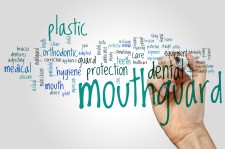Do Mouthguards Cause Cavities? The Sacramento Dentistry Group Answers

SACRAMENTO, Calif., June 26, 2018 (Newswire.com) - Mouthguards worn during sports, biteguards for sleep to prevent grinding, and Invisalign trays inserted to straighten teeth – there are lots of people wearing plastic in their mouth. Can these devices cause cavities? The answer isn’t a simple yes or no. If people invest in mouthguards to protect their teeth or Invisalign for better smiles, they care about their teeth and dental health. The last thing they want to use or wear is something that contributes to more dental work.
Therefore, the Sacramento Dentistry Group reassures the users of mouthguards that “there is no need to worry about cavities from wearing mouthguards, nightguards or Invisalign. There is no “flaw” in their design that inherently leads to tooth decay.” Nevertheless, there are some easy steps that limit the microorganisms riding on these dental devices.
Anything inside the mouth picks up bacteria. Forks and spoons, pacifiers, straws, if it was in someone’s mouth, it has bacteria on it. Mouthguards and aligners are no different. They require regular cleaning, just like the teeth they are designed to fit. Without cleaning, they can be one more place that dangerous bacteria find safe harbor. These are the steps to take to prevent excessive bacterial contamination on any oral device (retainers included).
When a mouthguard is removed, both the teeth and the mouthguard need attention. Here are the steps to take:
- Wash the mouthguard with cool water and very mild soap, or with a toothbrush. Use a personal toothbrush or one designated for the task. Never use hot water to wash the device.
- After cleaning, rest the mouthguard in the case in which it came, taking care to let it air dry in a non-humid environment. If the mouthguard never dries out completely, keep it in a different room or location.
- It is okay to use over-the-counter denture cleaner tablets to clean a mouthguard, using the instructions included. Do not leave it in the solution longer than thirty minutes. In a pinch, a mild solution of hydrogen peroxide or mouthwash can be used for the soaking mixture, but avoid solutions containing alcohol. This deeper cleaning is advised once a week.
- Brush the teeth thoroughly after removing a mouthguard and before inserting it. At night, this would include flossing between all the teeth before inserting a nighttime biteguard.
- For oral devices used in sports, keep the mouthguard away from dirty objects, and use an over-the-counter spray designed to disinfect your mouthguard after each use.
- Only drink water when your mouthguard is in. If you remove it to eat or drink, at least rinse your mouth thoroughly with water and rinse the guard with water before putting it back.
When these habits are kept up, mouthguards and aligners can do their primary job - protecting and improving your teeth. Excellent oral hygiene throughout the day, and especially upon arising and before retiring each night, is of the best thing for your teeth. On visits to the dentist, the Sacramento Dentistry Group always recommends bringing in mouthguards and aligners for inspection and thorough cleaning. For more information about mouthguards, clear aligners and nightguards, contact the Sacramento Dentistry Group online or by calling 916-538-6900.
Source: Sacramento Dentistry Group
